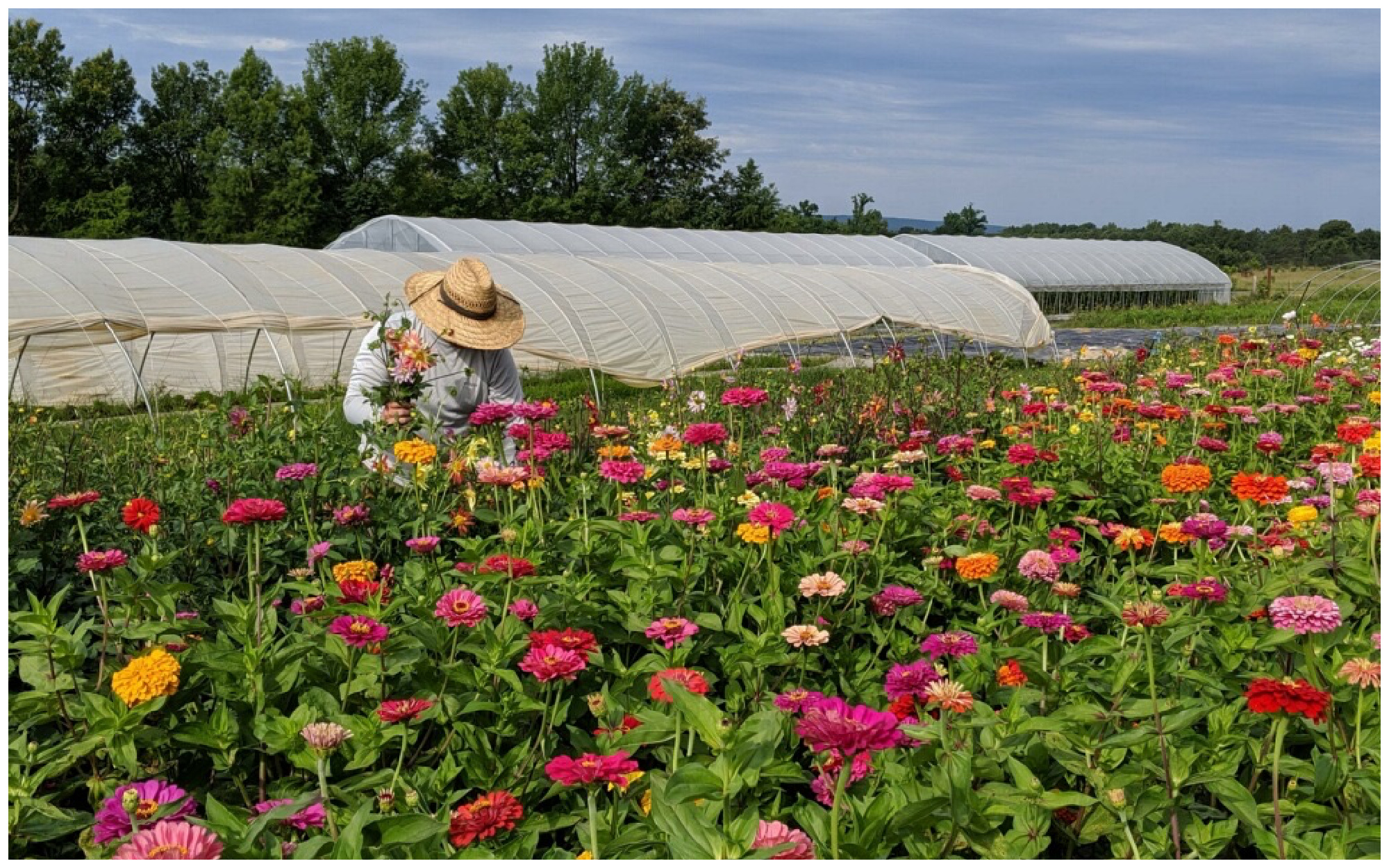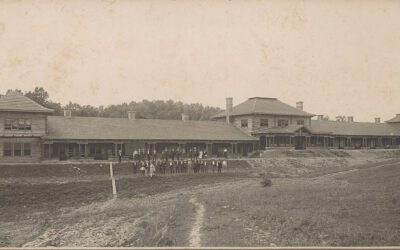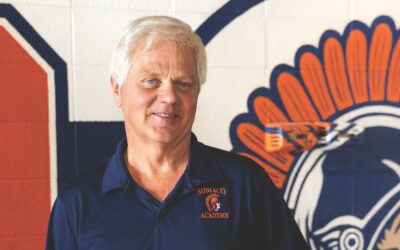Agriculture has always been a crucial part of world economy, but it is also critical to providing food to everyone who occupies the planet. Without farmers, crops would never see a harvest, livestock would not thrive, nations would starve.
With his background in ecology and his work as an environmental scientist, Sean Pessarra has always been passionate about the environment—but an even deeper level of passion lies in the dirt, digging his hands into the soil and cultivating something from nothing.
“Farming, for me, represents a way to positively impact our environment, communities and health,” says Pessara, who has been “chasing the dream” of owning his own farm for more than a decade—starting with part-time beekeeping while working as an environmental scientist in Texas. His passion for sustainable land stewardship led him to transition into sustainable agriculture in central Arkansas, during which time he managed organic vegetable production, conducted research and hosted workshops. As he learned more about sustainable farming, he saw the potential it had to not only do less harm to the ecosystem but to actually improve it.
Pessara’s realization set him on a mission to actively do something to bring about that improvement to the ecosystem, and the seed of an idea was planted—but still it had to grow and take shape. It was during his work at Heifer International, where he witnessed the challenges faced by small and mid-scale farms in the U.S., that his idea grew roots.
“Small-scale farming, or micro farming, has become more and more important to the ecosystem as well as to the growing food movement,” Pessara says. “Essentially, this is an effort to make farming and food more accessible, with a focus on strategies to increase profitability even on very small acreage. Lack of land because of the steep rise in land prices and access to capital have made it very restrictive for new farmers to get started, which is where micro farming comes into play.
“The challenge presented in small-scale—and even mid-scale—farming were that the tools and instruments available on the market were not appropriate, accessible, scalable or affordable,” he goes on. “As I worked with farmers across the South, I observed that tools were either oversized or under-sized and usually only served a single function. Because of this, I set out to design tools specifically for gardeners and farmers working on a scale ranging from their backyards up to a five-acre plot. The tools work for everyone, from beginning gardeners to professional farmers, and are just as useful in the backyard as the professional market farm. Also, during my time as a farm manager, I saw that most of the apprentices were young women who often struggled with some of the hand tools we had, as they were designed for broader shoulders and heavier bodyweights. We had one broadfork—a tool used for turning, tilling, lifting and aerating soil—that was too heavy and often created strain in the upper body and shoulders. The other broadfork we had was too light weight, making it ineffective and easily broken.”
All of this fueled Pessara’s vision, which was to design multifunctional, scalable, high-quality tools that would address these issues. To that end, he created the Finesse broadfork, which is ergonomically designed and inclusive, working for all body types of both men and women. Because of its multifunctionality, Pessara’s broadfork also prevents farmers from having to buy multiple tools to do the job, saving space, money and time.
And so, with that ingeniously designed broadfork, his idea grew into a fully realized business called Mindful Farmer.
But Pessara didn’t stop with just one tool.
Like all visionaries, he kept going, kept designing, using what he had learned in the fields to drive his designs in addition to seeking out feedback from one of his greatest target market segments. “It has been my experience that women now make up a majority of the new farmers getting started, so I look to them for input, advice and a better understanding of their needs and what they are looking for in tools,” Pessara explains.
And what they—as well as micro farmers as a whole—are looking for can now be found in the range of tools, supplies and resources Pessara has specifically tailored to small-scale growers. Mindful Farmer’s product lineup includes innovative items including his broadfork as well as high tunnels, chicken coops as other essentials to the life of a farmer—all of which, with the exception of the soil blockers, are Pessara’s own inventions, using a local manufacturer to bring to life from his designs. “Each was designed to make farming more efficient and alleviate specific pain points that farmers deal with on a daily basis with traditional tools,” says Pessara, who has a patent pending on several of his tools.
“We take pride in offering heirloom-quality, locally manufactured, efficient and ergonomic tools that are designed with the needs of farmers in mind,” says Pessara.
And while Pessara’s tools are incredibly important to the needs of a small-scale farmer, Mindful Farmer is more than just a supplier. In fact, what they offer goes beyond the tangible. “One of our key differentiators is our dedication to local sourcing and ethical practices,” Pessara contends. “By locally sourcing a majority of materials for our products and manufacturing them in Arkansas, we are directly supporting local businesses and artisans. This keeps money circulating within the local community, provides job opportunities and boosts the local economy.
“Additionally, our installation services for high tunnels are provided by local farmers who understand the unique challenges and requirements of the agricultural industry,” he goes on. “This not only guarantees the quality of our installations but also supports local farmers by providing them with additional income and opportunities. The agriculture industry is characterized by high risks and often low-profit margins, which makes it challenging for farmers to access the funding and support they need to thrive.”
Pessara’s ultimate goal is to allow small-scale farmers to have the equipment, tools and sense of community they need to compete with larger commercial operations and allow communities to take back control over their food systems. With the occurrence of droughts increasing and environments changing, food systems are threatened, which makes finding new ways to source and grow the food at a more local level of even greater importance.
Pessara and his wife, Melanie, share the same ethos and dedication to sustainability and eco consciousness. Melanie’s business, Mindful Kitchen, perfectly complements Mindful Farmer’s mission by prioritizing the creation of healthy and sustainable food options. “This closely aligns with our dedication to nourishing communities and the environment through conscientious food choices,” says Pessara.
Mindful Kitchen specializes in crafting nutritious, value-added products using ingredients that the couple cultivates themselves or source locally. Currently, their primary focus centers on elderberry syrup, though they have plans of introducing new product lines as their companies expand. Mindful Kitchen products are available at select locations throughout Arkansas and are also available for shipping.
“My amazing wife and I are shaping our dream of sustainable farming together,” Pessara says. “Alongside us are our three incredible children, who are not just witnesses but active participants in watching this dream unfold. Ultimately, I aspire to see a farming industry that prioritizes regenerative practices, cares for the environment and provides healthy, locally sourced food to all.”
For more information, visit mindfulfarmerarkansas.com.




